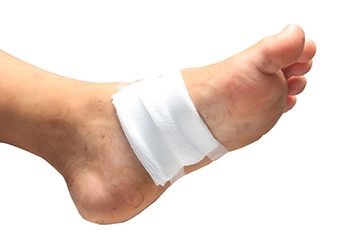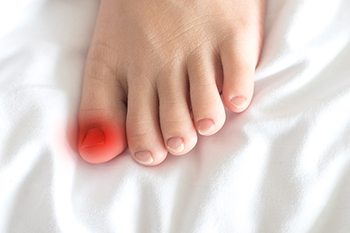Connect With Us
Blog
Items filtered by date: March 2023
Flat Feet in Children

Babies are born with flat feet because their bones and joints are flexible until their teenage years. Babies also have a fat pad on the inner border of their feet that hides the arch when standing. Flat feet in kids typically does not require medical treatment because arches will usually develop normally before adulthood. Even if arches do not develop, treatment is not recommended unless the foot feels stiff or causes pain. If such symptoms do occur, it is suggested that a podiatrist be seen for an evaluation and any recommended management for the problem.
The health of a child’s feet is vital to their overall well-being. If you have any questions regarding foot health, contact Dr. Richard Silverstein of Union Foot Care. Our doctor can provide the care you need to keep you pain-free and on your feet.
Tips for Keeping Children's Feet Healthy
- Make sure their shoes fit properly
- Look for any signs of in-toeing or out-toeing
- Check to see if they have Clubfoot (condition that affects your child’s foot and ankle, twisting the heel and toes inward) which is one of the most common nonmajor birth defects.
- Lightly cover your baby’s feet (Tight covers may keep your baby from moving their feet freely, and could prevent normal development)
- Allow your toddler to go shoeless (Shoes can be restricting for a young child’s foot)
- Cut toenails straight across to avoid ingrown toenails
- Keep your child’s foot clean and dry
- Cover cuts and scrapes. Wash any scratches with soap and water and cover them with a bandage until they’ve healed.
If you have any questions, please feel free to contact our office located in Havre de Grace, MD . We offer the newest diagnostic and treatment technologies for all your foot care needs.
How to Deal With Wounds on the Feet

Parents have been experts on wound care for their family for many years. Bandages and antiseptic medications are standard medicine cabinet items in most houses. Certain areas of the body, such as the feet and toes, can be a bit more problematic when dealing with wounds. Any time you sustain an injury, such as a puncture wound or injury that will not stop bleeding, it is essential that you seek immediate medical help. But for other types of wounds, injuries, or sores, home care may be sufficient. For instance, in most cases, a blister on the foot will heal itself, given enough time. But if a blister pops, the risk of infection increases and protecting it with a bandage that provides cushioning is a good idea. Sores on the feet and toes can pose additional problems that can be solved with special bandages that fit odd-shaped areas. Keeping these dry and changing them regularly is essential. For any type of sore or wound on the foot that is causing increased pain or showing signs of infection, it is suggested that you visit a podiatrist.
Wound care is an important part in dealing with diabetes. If you have diabetes and a foot wound or would like more information about wound care for diabetics, consult with Dr. Richard Silverstein from Union Foot Care. Our doctor will assess your condition and provide you with quality foot and ankle treatment.
What Is Wound Care?
Wound care is the practice of taking proper care of a wound. This can range from the smallest to the largest of wounds. While everyone can benefit from proper wound care, it is much more important for diabetics. Diabetics often suffer from poor blood circulation which causes wounds to heal much slower than they would in a non-diabetic.
What Is the Importance of Wound Care?
While it may not seem apparent with small ulcers on the foot, for diabetics, any size ulcer can become infected. Diabetics often also suffer from neuropathy, or nerve loss. This means they might not even feel when they have an ulcer on their foot. If the wound becomes severely infected, amputation may be necessary. Therefore, it is of the upmost importance to properly care for any and all foot wounds.
How to Care for Wounds
The best way to care for foot wounds is to prevent them. For diabetics, this means daily inspections of the feet for any signs of abnormalities or ulcers. It is also recommended to see a podiatrist several times a year for a foot inspection. If you do have an ulcer, run the wound under water to clear dirt from the wound; then apply antibiotic ointment to the wound and cover with a bandage. Bandages should be changed daily and keeping pressure off the wound is smart. It is advised to see a podiatrist, who can keep an eye on it.
If you have any questions, please feel free to contact our office located in Havre de Grace, MD . We offer the newest diagnostic and treatment technologies for all your foot care needs.
Pickleball and Foot Injuries

Pickleball is a popular sport, and it is a combination of tennis and badminton. Research has shown the average age for players is approximately 40 years old and a large percentage of players are over the age of 55. This sport involves the feet moving suddenly in all directions, which may put stress on the ligaments and tendons surrounding the ankle joint. Many people endure ankle injuries, but the range of motion may be maintained when an ankle brace is worn. Achilles tendonitis is another injury that pickleball players may be prone to. This can happen as a result of repetitive stress to the Achilles tendon. It is in the back of the lower leg, and it connects the heel to the calf muscles. Heel pain may accompany this type of injury. Additionally, the heel may become bruised from playing on hard surfaces, which may lead to plantar fasciitis. This is a tearing or inflammation of the plantar fascia, which is found on the sole of the foot and connects the heel to the toes. If you are interested in playing pickleball, it is suggested that you speak with a podiatrist who can inform you of effective methods to help prevent foot injuries.
Foot Pain
Foot pain can be extremely painful and debilitating. If you have a foot pain, consult with Dr. Richard Silverstein from Union Foot Care. Our doctor will assess your condition and provide you with quality foot and ankle treatment.
Causes
Foot pain is a very broad condition that could be caused by one or more ailments. The most common include:
- Bunions
- Hammertoes
- Plantar Fasciitis
- Bone Spurs
- Corns
- Tarsal Tunnel Syndrome
- Ingrown Toenails
- Arthritis (such as Gout, Rheumatoid, and Osteoarthritis)
- Flat Feet
- Injury (from stress fractures, broken toe, foot, ankle, Achilles tendon ruptures, and sprains)
- And more
Diagnosis
To figure out the cause of foot pain, podiatrists utilize several different methods. This can range from simple visual inspections and sensation tests to X-rays and MRI scans. Prior medical history, family medical history, and any recent physical traumatic events will all be taken into consideration for a proper diagnosis.
Treatment
Treatment depends upon the cause of the foot pain. Whether it is resting, staying off the foot, or having surgery; podiatrists have a number of treatment options available for foot pain.
If you have any questions, please feel free to contact our office located in Havre de Grace, MD . We offer the newest diagnostic and treatment technologies for all your foot care needs.
It's Time for Beautiful Feet
Should I Cut an Ingrown Toenail?

Even if you do not know all that much about the field of podiatry, there is a chance that you might already be familiar with what an ingrown toenail is. This condition is essentially characterized by the growth of the side of the toenail into the skin, such that inflammation and redness occurs. Many individuals living with an ingrown toenail often like to ask whether or not they can cut their ingrown toenails by themselves. The answer is that if a toenail is already ingrown, it is best not to attempt to cut it by yourself. Trying to do this by oneself can essentially increase the risk of possible infection. It might also make the ingrown toenail worse. Rather, an individual should seek out the guidance of a medical professional such as a podiatrist. If you are someone who is currently living with an ingrown toenail, it is suggested that you contact a podiatrist today.
Ingrown toenails can become painful if they are not treated properly. For more information about ingrown toenails, contact Dr. Richard Silverstein of Union Foot Care. Our doctor can provide the care you need to keep you pain-free and on your feet.
Ingrown Toenails
Ingrown toenails occur when a toenail grows sideways into the bed of the nail, causing pain, swelling, and possibly infection.
Causes
- Bacterial infections
- Improper nail cutting such as cutting it too short or not straight across
- Trauma to the toe, such as stubbing, which causes the nail to grow back irregularly
- Ill-fitting shoes that bunch the toes too close together
- Genetic predisposition
Prevention
Because ingrown toenails are not something found outside of shoe-wearing cultures, going barefoot as often as possible will decrease the likeliness of developing ingrown toenails. Wearing proper fitting shoes and using proper cutting techniques will also help decrease your risk of developing ingrown toenails.
Treatment
Ingrown toenails are a very treatable foot condition. In minor cases, soaking the affected area in salt or antibacterial soaps will not only help with the ingrown nail itself, but also help prevent any infections from occurring. In more severe cases, surgery is an option. In either case, speaking to your podiatrist about this condition will help you get a better understanding of specific treatment options that are right for you.
If you have any questions please feel free to contact our office located in Havre de Grace, MD . We offer the newest diagnostic and treatment technologies for all your foot and ankle needs.
Blog Archives
- March 2025
- February 2025
- January 2025
- December 2024
- November 2024
- October 2024
- September 2024
- August 2024
- July 2024
- June 2024
- May 2024
- April 2024
- March 2024
- February 2024
- January 2024
- December 2023
- November 2023
- October 2023
- September 2023
- August 2023
- July 2023
- June 2023
- May 2023
- April 2023
- March 2023
- February 2023
- January 2023
- December 2022
- November 2022
- October 2022
- September 2022
- August 2022
- July 2022
- June 2022
- May 2022
- April 2022
- March 2022
- February 2022
- January 2022
- December 2021
- November 2021
- October 2021
- September 2021
- August 2021
- July 2021
- June 2021
- May 2021
- April 2021
- March 2021
- February 2021
- January 2021
- December 2020
- November 2020
- October 2020
- September 2020
- August 2020
- July 2020
- June 2020
- May 2020
- April 2020
- March 2020
- February 2020
- January 2020
- December 2019
- November 2019
- October 2019
- September 2019
- August 2019
- July 2019
- June 2019
- May 2019
- April 2019
- March 2019
- February 2019
- January 2019
- December 2018
- November 2018
- October 2018
- September 2018
- August 2018
- July 2018
- June 2018
- May 2018
- April 2018
- March 2018
- February 2018
- January 2018
- December 2017
- November 2017
- October 2017
- September 2017
- August 2017
- July 2017
- June 2017
- May 2017
- April 2017
- March 2017
- February 2017
- January 2017
- December 2016
- November 2016
- October 2016
- September 2016
- August 2016
- July 2016
- June 2016
- May 2016

